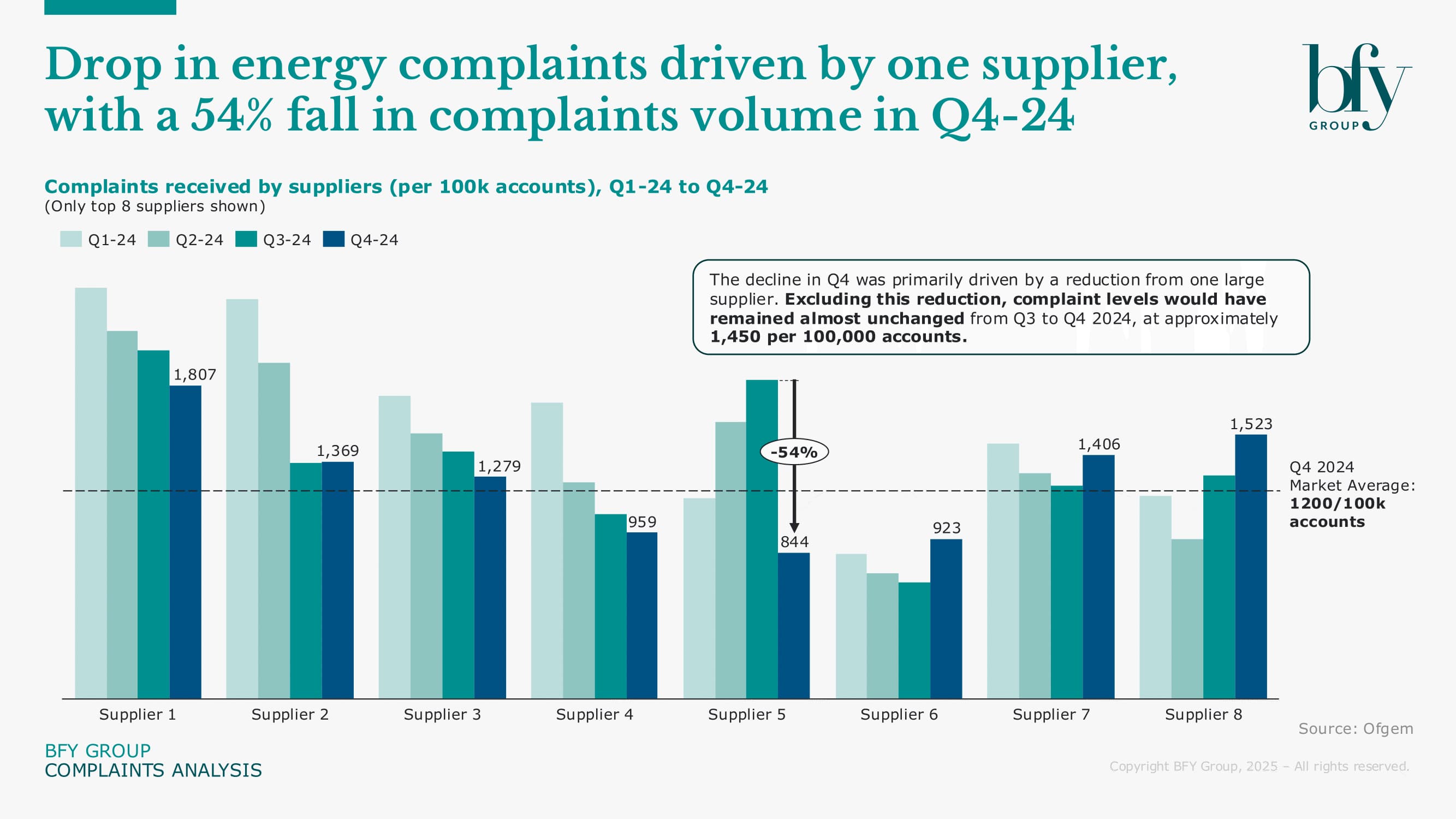With customer satisfaction at an all-time high, why haven’t complaint volumes fallen more significantly?
Recent Ofgem data shows a 19% drop in complaints from Q3 to Q4 2024, falling from 1,482 to 1,200 complaints per 100k accounts. However, excluding one supplier that reduced complaints by 54%, the overall decline is much smaller, dropping only from 1,482 to ~1,450. This suggests minimal progress in reducing complaints across the industry.

Meanwhile, the January 2025 Energy Consumer Satisfaction Survey, commissioned by Ofgem and Citizens Advice, shows record-high satisfaction at 81%, up from 73% in January 2024. Customer service satisfaction also reached its highest level since 2020, with improvements in billing, customer service, and ease of contact.
So, with satisfaction metrics on the rise, why haven’t complaint volumes fallen faster? This disconnect raises questions about the complexity of modern complaints and how effectively they’re being addressed. With annual complaints costs averaging £5m-£9m per supplier, targeted improvements offer a major opportunity for savings and competitive advantage, as outlined below.
Have suppliers stabilised to the new demands of their customers?
The 2021 energy crisis drove prices upward, and trust plummeted to an all-time low. By March 2022, customer dissatisfaction reached 21%, while satisfaction fell to just 66%. As switching options were paused and customer debts mounted, people needed more support than ever before. This led to a surge in customer inquiries from those seeking advice and assistance.
Suppliers responded with structural changes: specialist teams, enhanced digital channels, agent training in financial support, and major operational investments including process redesigns and re-platforming. These aimed to reduce contact volume and improve issue resolution.
The market has also undergone considerable consolidation, with larger suppliers absorbing smaller companies unable to weather the crisis. When switching resumed in early 2023, suppliers faced fresh pressure from increased competition, evolving tariff structures, and a surge in switching activity.
Yet, rising customer confidence suggests these efforts are delivering results. Investments in frontline capability — particularly the adoption of universal agent models that resolve issues without handoffs — are helping to rebuild trust and improve the overall experience.
Suppliers seem to be at an inflection point, ready to shift from a generally reactive stance to a more consistently proactive approach to customer engagement.
Why haven’t operational improvements translated into fewer complaints?
Despite signs of improvement in service satisfaction, complaint numbers remain stubbornly persistent. Since Q1 2020, complaint volumes have barely shifted, with only a slight decrease compared to Q3 2024. This trend suggests that long-standing complaint drivers, such as fuel poverty, issues affecting vulnerable customers, billing errors, and challenges related to system migrations, continue to persist for some suppliers.
At the same time, while day-to-day service satisfaction is improving, complaint handling satisfaction remains stagnant, with survey data from July 2024 to January 2025 showing only a slight reduction from 47% to 44%. This may be due to the challenge of restoring satisfaction for deeply dissatisfied customers, though there's no data to confirm this.
Shifting expectations could also be at play. Are more customers now empowered to complain? Or has prolonged strain, from COVID-19, the energy crisis, and price caps, lowered expectations, making “adequate” service seem good?
Additionally, it's important to question the representativeness of the satisfaction survey. With a sample size of only 4,000 customers in a much larger market, it may not offer a statistically reliable reflection of the overall customer experience, especially in areas like complaints and service recovery. Industry leaders should advocate for more robust measurement methods that encompass a wider range of customer experiences.
In summary, it's clear that much of the sector's focus over the past two to three years has been on front-end operational recovery. While this was a necessary priority, it has left complaints-handling processes underdeveloped and in need of improvement.
Seizing the opportunity to improve complaints performance
The cost of neglecting complaints performance is substantial - poor service, rising complaint volumes, and inefficient processes all erode trust, while driving annual costs of up to £9m per supplier. Addressing root causes not only improves customer outcomes but delivers significant savings and competitive advantage.
Key focus areas:
Identify and address root causes
Do you have a clear understanding of the root causes behind your major complaint drivers? If so, is there a defined improvement plan in place to address them?
Enhance communication and transparency
Are you effectively managing complaints caused by customer misunderstanding or lack of awareness, on topics like billing, tariffs, and service changes? Is this being addressed efficiently at the frontline?
Improve first-contact resolution
Are your frontline agents trained and empowered to prevent repeat and escalated complaints by taking corrective action at the initial point of contact?
Invest in smart meter and system reliability
Are your complaints teams providing smart meter-related complaint data, including time and cost impacts, to support business cases for resolving communication errors?
Refine complaint handling processes
Are you tracking customer satisfaction levels for resolved complaints? If so, do you have an action plan to improve where needed?
Leverage data and analytics
Are you and your teams consistently using data and AI to analyse demand drivers, identify trends, and implement action plans to improve outcomes?
Solicit and act on feedback
Are your complaints managers using customer feedback, Ofgem/CAB data, and other sources to reduce complaints and continuously improve the complaints process?
If you can’t confidently answer “yes” to these questions, there’s likely untapped potential in your complaints strategy. Done well, improvements can reduce costs, cut complaint volumes, and build long-term customer trust.
At BFY, we support clients across the entire complaints journey - from root cause analysis to full transformation. We recently helped an energy retailer avoid £7.5m in costs through targeted improvements.
Whether you need a comprehensive health check of your complaints process, or focused support to elevate specific areas to best practice, our experts provide tailored, end-to-end solutions.
To find out how we can help reduce complaints in your organisation, contact Rachel Littlewood.
Rachel Littlewood
Director
Rachel leads our operational and financial turnaround engagements, helping to solve complex operational challenges while maximising commercial performance and customer outcomes.
View Profile

